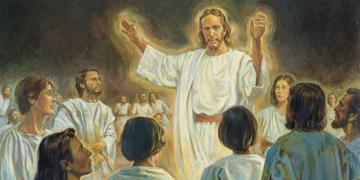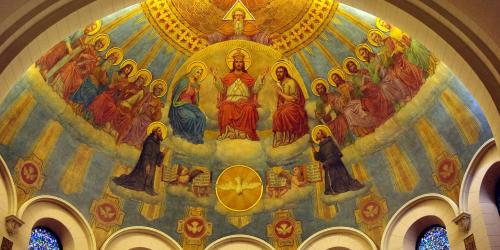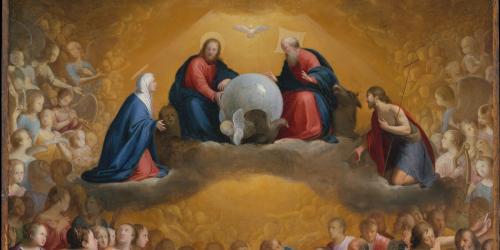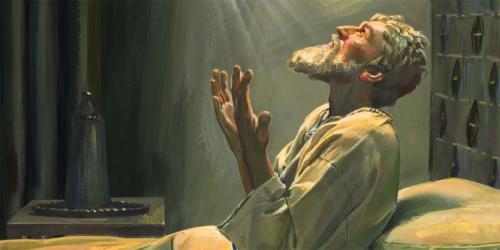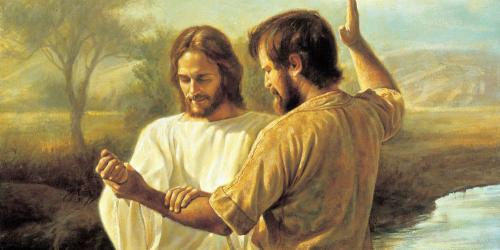November 26, 2019
1 and 2 Peter: “Rejoice with Joy Unspeakable and Full of Glory”
Post contributed by
Stephen Smoot

The epistles of 1 and 2 Peter may be comparatively short, but they are significant for Latter-day Saints in that they anchor some of the more unique Restoration teachings to the New Testament.
For instance, President Joseph F. Smith’s vision of Jesus Christ preaching his gospel to the dead was prompted, in part, by his reading of 1 Peter 3:18–20 and 1 Peter 4:6.
1 Peter 3:18–20 | 1 Peter 4:6 |
For Christ also hath once suffered for sins, the just for the unjust, that he might bring us to God, being put to death in the flesh, but quickened by the Spirit: By which also he went and preached unto the spirits in prison; Which sometime were disobedient, when once the longsuffering of God waited in the days of Noah, while the ark was a preparing, wherein few, that is, eight souls were saved by water. | For for this cause was the gospel preached also to them that are dead, that they might be judged according to men in the flesh, but live according to God in the spirit. |
While modern revelation has expanded and clarified a number of doctrinal and procedural points when it comes to carrying out the work of redeeming the dead, the foundation of this Latter-day Saint practice is to be found in the apostolic and post-apostolic writings of the primitive Church of Jesus Christ.1
Another significant Latter-day Saint teaching is rooted in the language of 2 Peter. The opening verses of that epistle read:
Simon Peter, a servant and an apostle of Jesus Christ, to them that have obtained like precious faith with us through the righteousness of God and our Saviour Jesus Christ: Grace and peace be multiplied unto you through the knowledge of God, and of Jesus our Lord, According as his divine power hath given unto us all things that pertain unto life and godliness, through the knowledge of him that hath called us to glory and virtue: Whereby are given unto us exceeding great and precious promises: that by these ye might be partakers of the divine nature, having escaped the corruption that is in the world through lust. And beside this, giving all diligence, add to your faith virtue; and to virtue knowledge; And to knowledge temperance; and to temperance patience; and to patience godliness; And to godliness brotherly kindness; and to brotherly kindness charity. For if these things be in you, and abound, they make you that ye shall neither be barren nor unfruitful in the knowledge of our Lord Jesus Christ. But he that lacketh these things is blind, and cannot see afar off, and hath forgotten that he was purged from his old sins. Wherefore the rather, brethren, give diligence to make your calling and election sure: for if ye do these things, ye shall never fall. (2 Peter 1:1–10)
This passage admonishes that if readers wish to be “partakers of the divine nature” they must become sanctified through Christ by abounding in faith, virtue, knowledge, temperance, patience, godliness, brotherly kindness, and charity. The author of the epistle describes this process of becoming sanctified as making one’s “calling and election sure.”
Commenting on this passage, the Prophet Joseph Smith taught,
After a person has faith in Christ, repents of his sins, and is baptized for the remission of his sins and receives the Holy Ghost, (by the laying on of hands), which is the first Comforter, then let him continue to humble himself before God, hungering and thirsting after righteousness, and living by every word of God, and the Lord will soon say unto him, Son thou shalt be exalted. When the Lord has thoroughly proved him, and finds that the man is determined to serve Him at all hazards, then the man will find his calling and his election made sure, then it will be his privilege to receive the other Comforter, which the Lord hath promised the Saints, as is recorded in the testimony of St. John in the 14th chapter [John 14:12–27].2
This other Comforter, the Prophet taught, was “no more or less than the Lord Jesus Christ himself.” The “sum and substance” of this teaching in 2 Peter 1 was that righteous followers of Jesus Christ would one day be blessed to enter back into the presence of their Savior and partake of his heavenly nature, power, and goodness.3
This “more sure word of prophecy” (2 Peter 1:19) is alluded to in the Book of Mormon, which speaks of prophets such as Nephi and Lehi being brought into the presence of the Lord and partaking of heavenly mysteries only obtainable through direct revelation and communion with God.4 But rather than limit this eternal potential to only a select few, the message of the Book of Mormon is that all of God’s children who exercise faith in Jesus Christ, repent, are baptized by immersion for the remission of sins, and faithfully endure to the end will be blessed with an assurance of eternal life by the voice of God the Father (2 Nephi 31).5
Related Articles
- 1. Hugh W. Nibley, “Baptism for the Dead in Ancient Times,” in Mormonism and Early Christianity, The Collected Works of Hugh Nibley: Volume 4 (Salt Lake City and Provo, UT: Deseret Book and FARMS, 1987), 100–167; Daniel B. Sharp, “Vicarious Baptism for the Dead: 1 Corinthians 15:29,” Studies in the Bible and Antiquity 6 (2014): 36–66; David L. Paulsen, Roger D. Cook, and Kendel J. Christensen, “The Harrowing of Hell: Salvation for the Dead in Early Christianity,” Journal of the Book of Mormon and Other Restoration Scripture 19, no. 1 (2010): 56–77; David L. Paulsen and Brock M. Mason, “Baptism for the Dead in Early Christianity,” Journal of the Book of Mormon and Other Restoration Scripture 19, no. 2 (2010): 22–49; David L. Paulsen, Kendel J. Christensen, and Martin Pulido, “Redeeming the Dead: Tender Mercies, Turning of Hearts, and Restoration of Authority,” Journal of the Book of Mormon and Other Restoration Scripture 20, no. 1 (2011): 28–51; David L. Paulsen, Kendel J. Christensen, Martin Pulido, and Judson Burton, “Redemption of the Dead: Continuing Revelation after Joseph Smith,” Journal of the Book of Mormon and Other Restoration Scripture 20, no. 2 (2011): 52–69; Scott C. Esplin, “Wondering at His Words: Peter’s Influence on the Knowledge of Salvation for the Dead,” in The Ministry of Peter, the Chief Apostle, ed. Frank F. Judd Jr., Eric D. Huntsman, and Shon D. Hopkin (Provo, UT: Religious Studies Center; Salt Lake City: Deseret Book, 2014), 296–312; David L. Paulsen, Roger D. Cook, and Brock M. Mason, “Theological Underpinnings of Baptism for the Dead,” BYU Studies Quarterly 55, no. 3 (2016): 101–116; Kevin L. Barney, “Baptized for the Dead,” in “To Seek the Law of the Lord”: Essays in Honor of John W. Welch, ed. Paul Y. Hoskisson and Daniel C. Peterson (Orem, UT: The Interpreter Foundation, 2017), 15–63.
- 2. Joseph Fielding Smith, comp., Teachings of the Prophet Joseph Smith (Salt Lake City, UT: Deseret Book, 1976), 150; see “Discourse, between circa 26 June and circa 2 July 1839, as Reported by Willard Richards,” 19, online at www.josephsmithpapers.org.
- 3. Smith, Teachings of the Prophet Joseph Smith, 151; see “Discourse, between circa 26 June and circa 2 July 1839, as Reported by Willard Richards,” 20. See further the comments in Robert L. Millet, “Make Your Calling and Election Sure,” in The Ministry of Peter, the Chief Apostle, ed. Frank F. Judd Jr., Eric D. Huntsman, and Shon D. Hopkin (Provo, UT: Religious Studies Center; Salt Lake City: Deseret Book, 2014), 267–82.
- 4. Book of Mormon Central, “How Did God Call His Prophets in Ancient Times?” KnoWhy 17 (January 22, 2016); “Why Did Nephi Want to Know the Mysteries of God?” KnoWhy 442 (June 19, 2018); “Why Are Lehi’s Visions Like Those of Other Prophets in His Day?” KnoWhy 469 (September 20, 2018).
- 5. See further Book of Mormon Central, “What is the Doctrine of Christ?” KnoWhy 58 (March 21, 2016); “What is the Purpose of Baptism in the Book of Mormon?” KnoWhy 59 (March 22, 2016).
